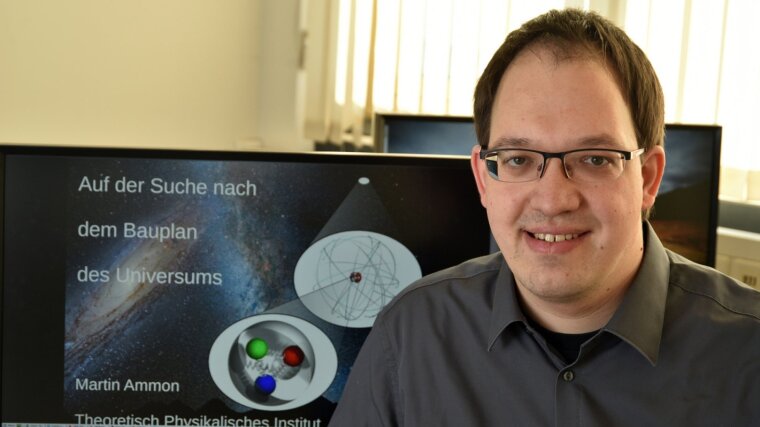
- Light
- Awards and Personnel
- Studies and Teaching
Published: | By: Stephan Laudien
Physicist Prof. Dr Martin Ammon has been honoured with the 2024 Teaching Prize from the Friedrich Schiller University Jena in the category “Special Commitment to Teaching”. The award, endowed with a prize of €2,500, will be presented on 19 November during “Dies legendi”, the University’s Day of Teaching. The prizewinner was described by the jury as an “exceptional educator” distinguished by “outstanding dedication” and “didactic excellence”. It was also emphasised that only students were eligible to submit nominations. Since Martin Ammon is a member of the Academy for Teaching Development (Ale), he was excluded from the award process following his nomination.
There is no “secret recipe” for good teaching
No, he does not have a “secret recipe” for good teaching, says Martin Ammon. However, he has always been keen to develop his own teaching style. The core of this is meeting students on equal terms, from day one. “I always greet the new students with ‘Dear colleagues’,” says Prof. Ammon. This is always met with surprise, along with the question of whether other professors are present. He then explains his understanding of the University, that the students are now part of the whole. “We share the space in the laboratory and develop new ideas together!”
Another pillar of good teaching, according to Martin Ammon, is continually seeking feedback. He says that responses regarding knowledge levels, progress, and gaps are essential to him. Therefore, he sets out clear learning objectives before each lecture and exercise. This is also helpful because the students bring different backgrounds. Some are studying for a Bachelor’s degree, others for a Master’s or a teaching qualification. When deficiencies are identified in the feedback, the Physics Café provides a solution. In this format, students from different years meet and benefit from mutual exchange, supported by capable tutors from higher semesters.
It should also be noted that students have different learning methods. While around half attend the lectures, another 30 % prefer to follow the lecture via stream, and the rest learn best with thematic teaching videos, says Martin Ammon. For him, this means varying his teaching and content, not always repeating the same material. Interaction is also important, as “anyone who talks for more than 25 minutes usually talks over people’s heads.”
“We need the best, those who are passionate about their subject”
What motivates him to want to be a good teacher? Martin Ammon has no simple answer to that. It is more likely a combination of several factors that create an overall picture. His experiences giving talks in schools throughout Thuringia have taught him that there are often only two or three pupils genuinely interested in physics. This is where efforts need to be concentrated, especially regarding new teachers in schools: “We need the best, those who are passionate about their subject!”
His own enthusiasm for physics is instantly apparent. The 43-years-old from Georgensgmünd in Middle Franconia studied in Erlangen and Cambridge, combining his interest in mathematics with physics. As a theoretical physicist, Martin Ammon now shares this enthusiasm with the new generation. As for how he will use the prize money, Martin Ammon has yet to give it much thought. The only certainty is: “I will use the prize money for teaching.”
In the category “Teaching Prize for the Best Course Concept”, the award goes to an interdisciplinary team of subject didacticians from philosophy and political science.